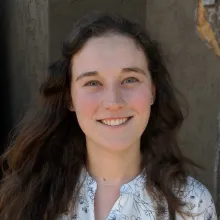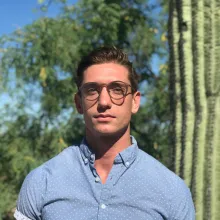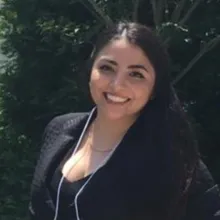Justice Advocates Coalition Bolsters Public Interest Careers at Arizona Law

Photo via Unsplash
It was Maura Hilser’s work as a disability case manager that first made her consider law school, as she became more interested in learning about public interest law and health law.

Now she has completed her second year at University of Arizona Law and has gained valuable experience in the field. Last summer, Hilser interned with the Tucson Family Advocacy Program, a partnership of health care providers and lawyers working together to improve the health and wellbeing of low-income patients and their families.
The unpaid internship was a viable option for Hilser thanks to being chosen as a Justice Advocates Coalition Fellow. The Justice Advocates Coalition (JAC) is a student-run organization that provides stipends to qualified students who accept unpaid summer positions with nonprofit law organizations. The JAC Fellowship covered Hilser’s living costs such as gas, rent and food for the summer.
“It was really meaningful for me to have finished my first year of law school and then to really be out there doing the work in the community that I had come to law school for,” says Hilser, who then served as the JAC development chair during the 2018-19 school year.
She says she felt fulfilled knowing that her contributions allowed the two attorneys on staff to have more time to work directly with clients. “It really feels like I have made a difference,” she says.
Students Helping Students
Students launched the Justice Advocates Coalition in 2017 with the dual goals of empowering marginalized communities and supporting Arizona Law students pursuing careers in public interest law.
Their efforts follow in the footsteps of similar past initiatives such as the Dean Paul Marcus Fellowship—founded in 1988 by professors Kenny Hegland and Andy Silverman—and the student-formed Public Interest Law Organization (PILO). The Marcus Fellowship and PILO combined funded more than 40 fellows during their 20 years in existence.
With those organizations no longer operating, Mia Hammersley (‘18), Amanda Rutherford ('18), both then 2Ls, and Wouter Zwart ('19), who was then a 1L, took up the baton and co-founded JAC. Hammersley says the fellowships began as a long-term project, but it soon took off more quickly than expected.
“What started off as a long-term goal quickly became a reality due to the hard work of our student group and the enthusiastic support we received from the faculty and the administration,” says Hammersley.
The Agnese Nelms Haury Program in Environment and Social Justice and Phoenix-based alumnus Wayne Howard ('71)were early sources of support.
JAC raised enough funds in its first year to support four students with living stipends and has matched that total in each subsequent year. The 12 total fellowships have funded students in public interest internships in Arizona and across the nation at organizations including the National Council of Urban Indian Health, the Florence Immigrant and Refugee Rights Project, the Arizona Capital Representation Project, Earthjustice, and the Arizona Center for Disability Law.
JAC also hosts career panels and guest speakers, maintains a career guide and has co-organized a student community service day.
“We have a lot of students who really want to use their law degrees to promote public interest, and they need our support,” says JAC faculty advisor Toni Massaro. “The students want to make this a law school where that is part of our DNA. I believe it is, but we can do more, and they are helping us do more.”
“Law is action. Law is change. Law is power.”

Rising 2L and current JAC Fellow Nathaniel Goodman is spending his summer interning at Freedom for All Americans (FFAA), an LGBTQ advocacy organization in Washington, D.C. He is working with the organization’s chief legal counsel in preparing amicus briefs for the recently consolidated Supreme Court cases concerning gay and transgender rights as protected in Title VII of the Civil Rights Act of 1964.
“To just have finished my first year of law school and now be working on what could be a landmark Supreme Court case is hard for me to grasp, and I’m still in disbelief, yet utter happiness,” says Goodman. “I am also lucky enough to sit in on and participate in team meetings where we discuss current issues facing the LGBTQ community and what work FFAA is doing to address these issues. It’s so rewarding to see and interact with a group of individuals who are so committed to a cause, and it gives me hope. These individuals are at the top of their games and I am learning so much from them.”
Goodman says the JAC fellowship has helped him realize the importance of social justice work and has opened his mind to the ways in which he can help.
“Social justice work is underfunded, but JAC presents an avenue for students to pursue those dreams without the financial burden looming overhead,” says Goodman, who plans to work with an organization or law firm protecting the rights of marginalized communities after graduating. “I am forever grateful for that."
“Law is action. Law is change. Law is power. You put these three together, and so much good can be done for the world,” says Goodman.

Rising 3L Yesenia Gamez Valdez has been selected as a JAC Fellow for two consecutive years. Last summer she worked at Southern Arizona Legal Aid, helping migrant women file U-Visa applications, communicate with the police department and translate declarations. This summer she is working with the Florence Immigrant and Refugee Rights Project.
“I work with detained children in Tucson who are either unaccompanied minors or separated from their families,” says Gamez Valdez. “I go into the shelters and give “Know Your Rights” presentations, and I am also working closely with the attorneys on their cases.”
She says the JAC fellowship was essential to her ability to work for those organizations, and the experiences helped solidify her decision to work in immigration law after law school.
“The students who make up JAC are making these positions a possibility for all of us and raising awareness of the importance of public interest law,” Gamez Valdez says.
Expanding Arizona Law’s Public Interest Employment Resources
The efforts of the Justice Advocates Coalition continue University of Arizona Law’s longstanding tradition of emphasizing and supporting public interest work.
This year the Career Development Office is expanding its efforts with a new position: an assistant director of public interest. Pare Gerou will fill the role, joining University of Arizona Law after more than two decades in public interest, with a focus on immigration law. Gerou, who has started multiple non-profits and directed the Refugee Law Clinic at the University of Virginia, will counsel students seeking public interest careers, manage Career Development Office relationships with public interest employers, and help students and recent graduates obtain funding for entry-level public interest positions.
One of the Career Development Office’s longest running programs is the Sonoran Desert Public Interest/Public Sector Career Fair, which the college has hosted annually for nearly two decades. The Sonoran Career Fair is devoted exclusively to government agencies, nonprofits and other public interest groups, drawing up to 50-60 employers and resulting in hundreds of scheduled interviews.
Additional resources from the college’s Career Development Office, which is staffed by multiple counselors with deep public sector experience, include:
-
weekly Career Corner guest speakers, workshops and panels that often feature public interest topics
-
a robust job directory (CareerCAT) that posts nearly 200 public interest positions each month
-
a resource library for students and alumni that includes government and public interest exploration resources, agency and organization directories, links to job boards, and handbooks for work in government and public interest sectors
-
administration of the Federal Work Study program, a federal financial aid program that funds employment for law students at qualifying off-campus nonprofit, federal or state employers.
“The world needs them, so we need to help them.”
Each year, JAC sets a $10,000 minimum fundraising goal in order to award at least four summer fellowships. Students raise money throughout the academic year, culminating in an annual spring fundraiser where students share their personal stories and career goals with attendees who support public interest work.
The event has grown in attendance and amount of funds raised each year—yet JAC is still unable to meet the growing demand of students applying for JAC fellowships. This year, about a dozen applications were submitted, but only four fellowship slots were available.
“We are grateful for the support of donors because it can make a difference between one more student who is able to take that job and not worry about how they will pay the bills while they are working,” says Hilser, the group’s development chair.
JAC donor Lynne Wood Dusenberry (‘74) spent her entire legal career in public interest—first as a Naval Reserve JAG Corps officer and then in the University of Arizona’s Office of the General Counsel. She places a premium on work that serves vulnerable communities and the public.
“I am so impressed with this student-led initiative to help underserved clients and groups by working in public interest non-profit law organizations,” says Wood Dusenberry. “My husband and I are happy to help smart and caring students get paid to do good work helping others.”
Massaro hopes JAC will one day have an endowment that will relieve students of the fundraising work and also allow more students to receive fellowships.
“I am hopeful that we will find a way to make this something permanent,” says Massaro.
She adds, “Few things make me prouder of our students than this organization. Those who began it and those who are sustaining it, their values, and their desire to apply their many gifts, intellectually and educationally to help others. They epitomize what professional ethics and practice can look like. The world needs them, so we need to help them.”
Click here to donate to the Justice Advocates Coalition. For more information, contact Megan O’Leary, director of development, at 520-626-1330 or moleary@email.arizona.edu.
